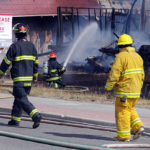Home »

Political change in the air but what will it be?
A political junkie’s paradise! That’s what B.C. has become now and this melodrama is going to continue for weeks and maybe more.
But that’s going to depend on the players and you can bet all three will be in locked rooms this weekend with the curtains pulled as they meet with their anxious advisors pondering their next move.
And small wonder, because the next few weeks are going to be critical in B.C. political history because they will undoubtedly shape our political future and could result in a sea change in the B.C. political narrative.
The last time we had a minority government was 1952 when Social Credit came to the fore. And less than a year after they were elected, the maverick Socreds under WAC Bennett called a snap election and won a majority, which led to more than 30 years of Socred rule. And when you drill down deeper, there are some obvious parallels between the situation then and now.
Back in 1952, B.C., like the rest of the world, had finally shaken off the devastating effects of the Second World War and was ready for change in a big way. A coalition of Conservatives and Liberals had been in power for almost a decade, but was becoming unglued because of infighting and corruption. Infrastructure was quite primitive back then with few good provincial roads and few big industries, a situation ripe to be exploited by a businessman like Bennett with dollar signs in his eyes and “Flying Phil” Gaglardi, who had never met a bulldozer he didn’t like.
And the rest, like the old cliché says, was history as the province erupted into more than 50 years of road building, dam building, pulp mill building, pipelines– you name it. But that was then and this is now so what’s the connection?
Let me explain.
As a famous prime minister once said with arched eyebrows: “because it’s 2015.” Well, it’s 2017 now, and as Justin Trudeau was trying to get across, TIMES HAVE CHANGED! In other words, the province’s primary needs now are no longer roads, sawmills and mega-developments. They’re still needed, of course, but they’re not our primary needs anymore. Our infrastructure is largely built, but what hasn’t been built yet is the capacity to deal with what our infrastructure has wrought.
And what is that, you rightfully ask? Let me tell you because it’s not rocket science.
Beautiful B.C. has the highest children’s poverty rate in Canada. We also have some of the most expensive housing in all the world and even professional families find it next to impossible to own a detached house in the Lower Mainland. Since fentanyl became available, many – far too many – of our residents have been dying on our streets like flies from drug overdoses. Even though we export more lumber to the U.S. than any other province our landscape has been disfigured by clear-cut logging from Nanaimo to Cranbrook. Maybe it’s time we set a stumpage formula that truly reflected the value of our precious forests as has been argued for years by the U.S. where timber pricing is set by the free market. And need I say that B.C. is being adversely affected by climate change like everywhere else
I could go on, but I think you get my drift.
So, what am I really saying? B.C. is now a mature post-industrial society where most jobs are in the service sector and not resource exploitation. And once again, as in 1952, B.C. is standing on the cusp of cataclysmic changes happening all over the world that cry out for a different kind of politics. Which of the two mainline parties is most open to practising politics differently? I’d argue neither. One is for the corporations and the other the unions, which is really the same thing.
Regardless of which old-line party forms a government, that government will rely heavily on the Green Party to survive. If Green Party leader Andrew Weaver is smart he’ll resist the temptation to join the governing party and instead keep his caucus independent and avoid being sullied by the old fashioned and old thinking mainline parties. And that will make Weaver virtually a shadow premier with immense power to shape legislation to his party’s liking.
And maybe some day Premier of B.C.
– Gerry Warner is a retired journalist who has covered B.C. politics for almost 40 years and has never seen such an intriguing election result.








